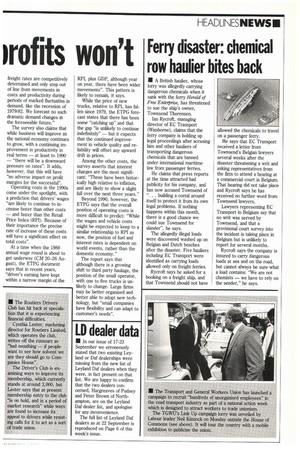Ferry disaster: chemical row haulier bites back
Page 7

If you've noticed an error in this article please click here to report it so we can fix it.
• A British haulier, whose lorry was allegedly carrying dangerous chemicals when it sank with the ferry Herald of Free Enterprise, has threatened to sue the ship's owner, Townsend Thorensen.
Ian Rycroft, managing director of EC Transport (Wimborne), claims that the ferry company is holding up legal proceedings after accusing him and other hauliers of transporting dangerous chemicals that are banned under international maritime law from passenger ferries.
He claims that press reports at the time attracted bad publicity for his company, and has now accused Townsend of ". . . building a corral around itself to protect it from its own legal problems. If nothing happens within this month, there is a good chance we could sue Townsend for slander", he says.
The allegedly illegal loads were discovered washed up on Belgian and Dutch beaches after the disaster. Five hauliers including EC Transport were identified as carrying loads allowed only on freight ferries.
Rycroft says he asked for a booking on a freight ship, and that Townsend should not have allowed the chemicals to travel on a passenger ferry.
He says that EC Transport received a letter from Townsend's Belgian lawyers several weeks after the disaster threatening a writ and asking representatives from the firm to attend a hearing at a commercial court in Belgium. That hearing did not take place and Rycroft says he has received no further word from Townsend lawyers.
Lawyers representing EC Transport in Belgium say that no writ was served by Townsend, and that a provisional court survey into the incident is taking place in Belgium but is unlikely to report for several months.
Rycroft says the company is insured to carry dangerous loads at sea and on the road, but cannot always be sure what a load contains: "We are not chemists — we have to rely on the sender," he says.




































































































































